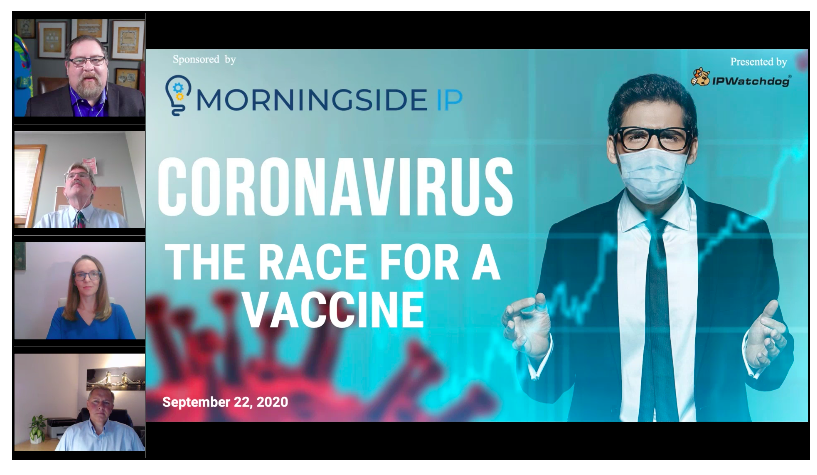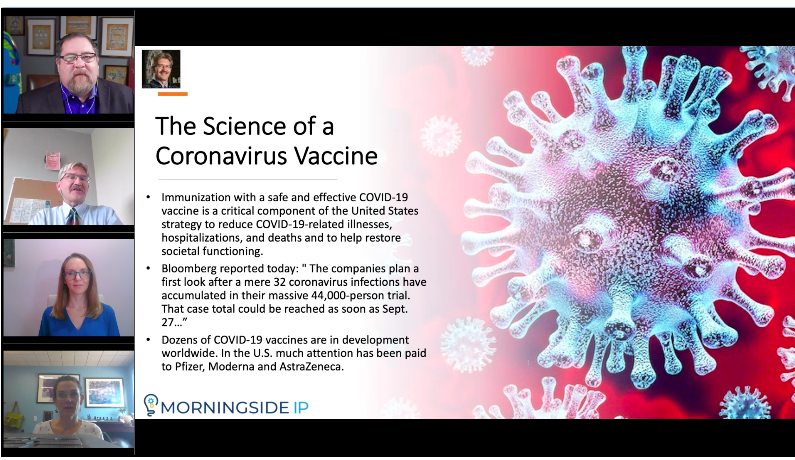“The evidence we have suggests IP has only been helpful here, not a hindrance. And I’m not sure exactly what evidence people who want to take away patent rights on these products have that that would do anything to help.” – Melissa Brand
 IPWatchdog’s most recent webinar focused on the role of IP in the development of the most promising vaccines to combat COVID-19 and included speakers from the medical community, the U.S. Food and Drug Administration (FDA) and the biopharmaceutical industry. The upshot was: wear masks, get the vaccine when it’s available to you, trust the FDA, and stop targeting IP rights, since there’s no evidence they have hindered the process and, in fact, IP has so far played a crucial role in collaboration efforts.
IPWatchdog’s most recent webinar focused on the role of IP in the development of the most promising vaccines to combat COVID-19 and included speakers from the medical community, the U.S. Food and Drug Administration (FDA) and the biopharmaceutical industry. The upshot was: wear masks, get the vaccine when it’s available to you, trust the FDA, and stop targeting IP rights, since there’s no evidence they have hindered the process and, in fact, IP has so far played a crucial role in collaboration efforts.
The Candidates
Jonathan L. Temte, Associate Dean for Public Health and Community Engagement at the University of Wisconsin School of Medicine and Public Health, explained the science behind the three most promising vaccines, which are being developed by Moderna, Pfizer and AstraZeneca. With the United States at more than 200,000 deaths from COVID-19, 7 million confirmed cases, and evidence of another acceleration in cases, it is vital that the public trusts a vaccine once it is available, Temte said.
One recent poll found that only about 42% of Americans said they would get a vaccine that becomes available before the U.S. presidential election in November. “The vaccine program is only successful when you have a safe vaccine as well as an appropriate level of uptake,” he added.
There are currently three top vaccine candidates:
- Moderna’s mRNA-1273, which must be stored at -20 degrees Celsius and requires two doses 28 days apart is in Phase 3 trials;
- Pfizer’s mRNA BNT162b2, which must be stored at -70 degrees Celsius and requires two doses 21 days apart is also in Phase 3 trials; and
- AstraZeneca’s chimpanzee adenovirus vaccine AZD1222, which was previously used during the MERS outbreak and also requires two doses, but has been marred by concerns over potential links to transverse myelitis in some patients.
Temte said that, short of a vaccine, the virus can be effectively controlled by widespread and consistent use of masks and other preventative measures. “[Masks, social distancing, hand washing and testing] work,” Temte said. “Where countries have been adherent, this virus largely lays down and attention gets turned to ‘hot-spotting’, where you have an outbreak and go in and contain it. Life has returned to normal in a lot of places. On the flip side, in places where the utility of masking is dismissed, you have this virus running rampant.”
Safety Won’t Be Sacrificed
Erika Leitzan, Associate Professor of Law at the University of Missouri School of Law and an FDA law expert, urged listeners to trust the FDA. “The scientists, regulatory experts and administrators at the FDA are folks that have made careers working in the interest of public health; if the Center for Biologics Evaluation and Research signs off on a vaccine for COVID-19, the approval standard has been met.” Leitzan explained the approval process for vaccines and emphasized that the federal agencies “are very invested in ensuring the benefits are worth the risk.”
Doing the Hard Work
At the center of the debate, of course, are the companies that are feverishly working to get these vaccines developed, approved and marketed. Melissa Brand, Assistant General Counsel and Director of Intellectual Property at the Biotechnology Innovation Organization (BIO), said that the United States’ longstanding and strong IP policies have allowed U.S. companies to mobilize quickly and to have a “robust response” to the pandemic.
 On September 8, the CEOs of seven top biopharmaceutical companies signed a pledge to make the safety and efficacy of any COVID-19 vaccine top priority. “We believe this pledge will help ensure public confidence in the rigorous scientific and regulatory process by which COVID-19 vaccines are evaluated and may ultimately be approved,” said the pledge.
On September 8, the CEOs of seven top biopharmaceutical companies signed a pledge to make the safety and efficacy of any COVID-19 vaccine top priority. “We believe this pledge will help ensure public confidence in the rigorous scientific and regulatory process by which COVID-19 vaccines are evaluated and may ultimately be approved,” said the pledge.
Brand emphasized the unprecedented collaboration that has occurred among companies thus far, and said there is little basis for anti-patent proposals that would limit exclusive rights to treatments or vaccines. Many companies are engaging in “at-risk manufacturing” by producing doses of the vaccine before approvals are obtained in order to ensure availability once they have the green light and have taken on considerable financial risk in an effort to help. “I think it’s interesting that we’re seeing this dialogue already about needing to take a stick to industry when it comes to IP rights, when industry’s done nothing but step up and show that it’s doing its part to try to solve this problem,” Brand said. “It’s not even clear at this point what sort of IP they think might be a problem.”
Brand said that patents take years to issue, and the so-called platform technologies behind many of the vaccines have been easily licensed or accessed by relevant parties. She added:
What I’ve heard and seen is industry moving very quickly to collaborate; we’ve heard reports of people who need access to platform technologies being able to get in touch with companies very quickly, and letters of intent, for example, serving as the basis for rapid collaboration. So, the evidence we have suggests IP has only been helpful here, not a hindrance. And I’m not sure exactly what evidence people who want to take away patent rights on these products have that that would do anything to help.
Brand also argued that pricing of vaccines has not been an issue, with estimates for COVID-19 vaccines so far being in the range of under $50 for two doses. In the case of Moderna, which took $1 billion in R&D aid from the U.S. government, the vaccine price is between $15 and $18. Some have argued that this amounts to taxpayers paying twice for the vaccine, but IPWatchdog founder Gene Quinn (who moderated the panel discussion) pointed out that if the company had not taken the government money, it likely would have charged $25-$30 for the vaccine instead, and in either scenario, it’s still cheaper than the flu vaccine.
At the end of the day, said both Quinn and Brand, there is little evidence that IP rights have served as a roadblock in the fight against COVID-19 to justify any legislative or regulatory restrictions.
“The US biopharmaceutical industry develops more new medicines than the rest of the world combined,” Brand said. “In the Covid context, we’re developing more therapies and vaccines than any other country, and a large part of that is due to the strong IP system here; so now is not the time to start tinkering with the IP system in a way that would weaken it and correspondingly the US biopharma industry.”
The webinar was sponsored by Morningside IP and can be viewed in its entirety by filling out this form.

![[IPWatchdog Logo]](https://ipwatchdog.com/wp-content/themes/IPWatchdog%20-%202023/assets/images/temp/logo-small@2x.png)

![[Advertisement]](https://ipwatchdog.com/wp-content/uploads/2024/05/Quartz-IP-May-9-2024-sidebar-700x500-1.jpg)
![[Advertisement]](https://ipwatchdog.com/wp-content/uploads/2024/04/Patent-Litigation-Masters-2024-sidebar-last-chance-700x500-1.jpg)

![[Advertisement]](https://ipwatchdog.com/wp-content/uploads/2021/12/WEBINAR-336-x-280-px.png)
![[Advertisement]](https://ipwatchdog.com/wp-content/uploads/2021/12/2021-Patent-Practice-on-Demand-recorded-Feb-2021-336-x-280.jpg)
![[Advertisement]](https://ipwatchdog.com/wp-content/uploads/2021/12/Ad-4-The-Invent-Patent-System™.png)






Join the Discussion
2 comments so far.
Albert T Keyack
September 28, 2020 11:03 amI agree with Jonathan. Although I have long been an advocate for strong IP rights for biopharma (and against ideas like compulsory licenses) there comes a time for exceptions, and the voluntary, private nature of this pledge make it all the more useful.
Jonathan Stroud
September 24, 2020 10:56 amI’m sure I will get raked over the coals for saying it, but I think the Industry pledge and the OPEN COVID Pledge are smart, tailored, private collective solutions to current concerns, and they’re all voluntary, and should be celebrated—they help avoid calls for public regulatory responses from Congress (like compulsory licensing) and show that industry can voluntarily self-manage. In that respect I wholeheartedly agree with my friend Mrs. Brand’s comments and position, personally.